Related Research Articles

Malayalam is a Dravidian language spoken in the Indian state of Kerala and the union territories of Lakshadweep and Puducherry by the Malayali people. It is one of 22 scheduled languages of India. Malayalam was designated a "Classical Language of India" in 2013. Malayalam has official language status in Kerala, Lakshadweep and Puducherry (Mahé), and is also the primary spoken language of Lakshadweep. Malayalam is spoken by 35 million people in India. Malayalam is also spoken by linguistic minorities in the neighbouring states; with a significant number of speakers in the Kodagu and Dakshina Kannada districts of Karnataka, and Kanyakumari, Coimbatore and Nilgiris district of Tamil Nadu. It is also spoken by the Malayali Diaspora worldwide, especially in the Persian Gulf countries, due to the large populations of Malayali expatriates there. They are a significant population in each city in India including Mumbai, Bengaluru, Chennai, Delhi, Hyderabad etc.

Malayalam, the lingua franca of the Indian state of Kerala and the union territories of Lakshadweep and Puduchery, is one of the six classical languages of India. Malayalam literature comprises those literary texts written in Malayalam, a South-Dravidian language spoken in the Indian state of Kerala. The first travelogue in any Indian language is the Malayalam Varthamanappusthakam, written by Paremmakkal Thoma Kathanar in 1785. Malayalam literature has been presented with 6 Jnanapith awards, the second-most for any Dravidian language and the third-highest for any Indian language.
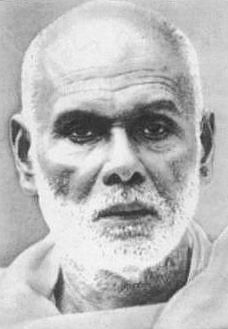
Sree Narayana Guru was a philosopher, spiritual leader and social reformer in India. He led a reform movement against the injustice in the caste-ridden society of Kerala in order to promote spiritual enlightenment and social equality. A quote of his that defined his movement was "one caste, one religion, and one god for all human beings." He is the author of the Advaita poem Daiva Dasakam, which is one of the most used poem in Kerala for community prayer.
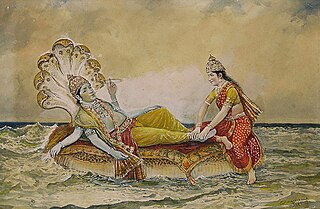
Narayana is one of the forms and epithets of Vishnu. In this form, the deity is depicted in yogic slumber under the celestial waters, symbolising the masculine principle and associated with his role of creation. He is also known as Purushottama, and is considered the Supreme Being in Vaishnavism.

Thunchaththu Ramanujan Ezhuthachan was a Malayalam devotional poet, translator and linguist. He was one of the prāchīna kavithrayam of Malayalam literature, the other two being Kunchan Nambiar and Cherusseri. He has been called the "Father of Modern Malayalam Literature", and the "Primal Poet in Malayalam". He was one of the pioneers of a major shift in Kerala's literary culture. His work is published and read far more than that of any of his contemporaries or predecessors in Kerala.
Stotra is a Sanskrit word that means "ode, eulogy or a hymn of praise." It is a literary genre of Indian religious texts designed to be melodically sung, in contrast to a shastra which is composed to be recited.

Sundara Kanda is the fifth book in the Hindu epic Ramayana. The original Sundara Kanda is in Sanskrit, and was composed in popular tradition by Valmiki, who was the first to scripturally record the Ramayana. Sundara Kanda is the only chapter of the Ramayana in which the principal protagonist is not Rama, but Hanuman. The work depicts the adventures of Hanuman and his selflessness, strength, and devotion to Rama are emphasised in the text. Hanuman is believed to have been fondly called "Sundara" by his mother Anjani, and Sage Valmiki is stated to have chosen this name over others as the Sundara Kanda is about Hanuman's journey to Lanka.
Melpathur Narayana Bhattathiri, third student of Achyuta Pisharati, was a member of Madhava of Sangamagrama's Kerala school of astronomy and mathematics. He was a mathematical linguist (vyakarana). His most important scholarly work, Prakriya-sarvasvam, sets forth an axiomatic system elaborating on the classical system of Panini. However, he is most famous for his masterpiece, Narayaneeyam, a devotional composition in praise of Guruvayurappan (Krishna) that is still sung at Guruvayur Temple.

Tirur is a major municipal town in Tirur Taluk, Malappuram district, in the Indian state of Kerala, spread over an area of 16.55 square kilometres (6.39 sq mi).

Adhyatma Ramayana is a 13th- to 15th-century Sanskrit text that allegorically interprets the story of Hindu epic Ramayana in the Advaita Vedanta framework. It is embedded in the latter portion of Brahmānda Purana, and the author is considered to be Vyasa. The Hindu tradition also attributes the text to the Bhakti movement saint Ramananda.

Ekasarana Dharma is a neo-Vaishnavite religion propagated by Srimanta Sankardeva in the 15th-16th century in the Indian state of Assam. It reduced focus on Vedic ritualism and focuses on devotion (bhakti) to Krishna in the form of congregational listening (shravan) and singing his name and deeds (kirtan).
Jnanappana is a devotional poem written by the 16th century Malayalam poet Poonthanam. This poem written as a devotional prayer to Guruvayoorappan is considered as an important work in Malayalam literature. Written in simple Malayalam, the Jnanappana was Poonthanam's magnum opus and is an important work of Bhakti literature from Kerala and is revered for its poetic merit and intensity of devotion.
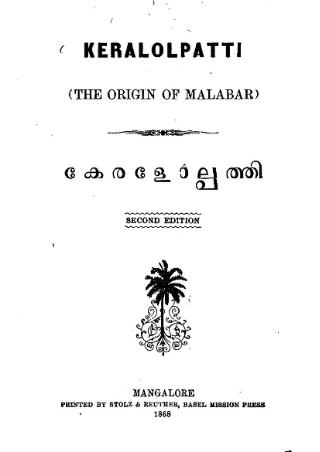
The Keralolpathi is a Malayalam Hindu literary work that deals with the origin and legends of the land of Kerala. P. Shungunny Menon ascribes the authorship of this work to Thunchaththu Ramanujan Ezhuthachan, a 17th-century scholar of the Malabar region of India. A. Sreedhara Menon dates the work to 18th or 19th century. The Keralolpathi is mostly an expansion from an earlier Sanskrit work known as the Kerala Mahatmayam. That work is classed among the Hindu Puranas as an Upa Purana of the Bhoogola Purana.
Cherusseri Namboothiri was a 15th-century Malayalam poet who belonged to Kolathunadu, in present-day North Malabar region of Kerala. He was a court poet of Udaya Varma (1446–1475) and the author of Krishna Gadha, a poem which is considered a landmark in the development of Malayalam literature.
Sankara Pillai Guptan Nair or S. Guptan Nair was an Indian scholar, academic, critic and writer of Malayalam literature.
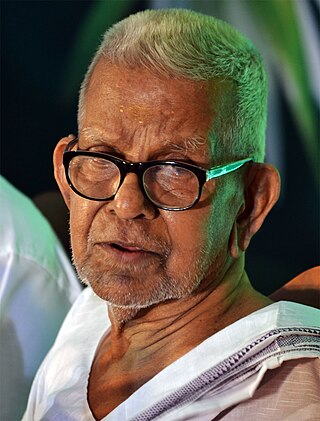
Akkitham Achuthan Namboothiri, popularly known as Akkitham, was an Indian poet and essayist who wrote in Malayalam. He was known for a simple and lucid style of writing, exploring themes of profound love and compassion in his works. Some of his prominent works included Irupatham Noottandinte Ithihasam, Balidarshanam, and Nimisha Kshetram.

V. R. Prabodhachandran Nayar, popularly known as VRP Nayar, is a Phonetics expert of Kerala. He is the pioneer in the study of the phonology of the Malayalam language. Apart from phonology, he is also interested in syntax and stylistics.

Thunchath Ezhuthachan Malayalam University, also called Malayalam University, is a state university in Tirur, Kerala, India.
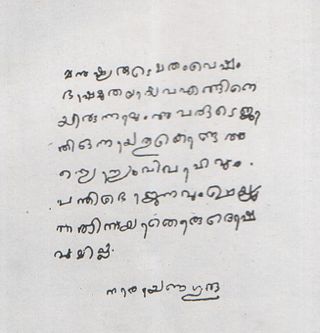
Ātmopadesa Śatakam is a Malayalam spiritual work by Narayana Guru in the form of a poem. It is considered as the classic work of Narayana Guru, who was a social reformer and spiritual leader of Kerala, India. The literal translation of the title means "One Hundred Verses of Self Instruction". "Atmopadesa Śatakam" contained 100 verses or stanzas, each describing a set of actions performed by the self on itself, affecting and recognising moments of transformation into an absolute value.
Ezhuthachan(, Malayalam: എഴുത്തച്ഛൻ, eḻuttacchan), also known as Kadupattar(, Malayalam: കടുപട്ടr, kaṭupaṭṭan) is a caste native to the Indian state of Kerala. It is classified as an Other Backward Class by the Government of India under its system of positive discrimination.
References
- ↑ "Thunchan Smaraka Samithi | Thunchaththu Ramanujan Ezhuthachan | Thunchath Ezhuthachan". Archived from the original on 2015-04-07. Retrieved 2015-02-24.